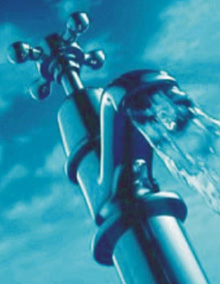 |
 |
 |
 Editorials | Environmental | July 2007 Editorials | Environmental | July 2007  
Welcome to the Bottled Water Follies
 Palladium-Item Palladium-Item
go to original


| | Bye-bye bottled water. Hello eau de tap. A new trend is in the pipeline, with some upscale restaurants ditching packaged H2O in the name of conservation. (See atricle HERE) |
The first time I paid for a bottle of water was in 1972 in Acapulco, Mexico. It cost me a dollar, and I remember being thankful that I lived in the United States, where tap water was safe and no one had to pay to quench a thirst.

But logic has little to do with our daily lives and nothing to do with fads. For no discernible reason, Americans began buying bottled water the way they once bought "pet rocks" and collected Beanie Babies.

Now it seems the backlash has begun.

Last week all the major television networks devoted a part of their news time to the problems of bottled water. They stated that bottled water is not only expensive; in most cases it has been found to be no better than tap water. They told us that shipping bottled water around the country and around the world is wasteful of energy. Then they told us that the worst problem is not the water but the 50 billion plastic bottles it comes in.

Less than 20 percent of these bottles are recycled; the rest are in landfills.

Or else, I might add, lying in the ditches along the road that goes by my place.

Several months ago I complained in this space about the large number of plastic water bottles I was seeing on my walks. I wrote that having polluted the streams, making the water undrinkable, we are now polluting the land with discarded plastic bottles.

Of course, people who live on county roads are accustomed to seeing the roadside ditches used as landfills. For several months now a porcelain toilet has lain beside the road just a hundred yards or so beyond my driveway. It is not far from where I once picked up a couch that someone decided would look good at the edge of the woods. I suppose I could take the toilet home and use it as a planter, but I always thought those looked tacky.

I used to clean up the roadsides near my place, but the charges at the local refuse station kept going up until I could no longer afford it. Come to think of it, the high price of dumping is probably one reason we are getting more trash along the road.

Last week I noticed that someone had cleaned out his car and left about 30 beer cans near the toilet bowl. After I finished my walk, I got in my car and went back to pick them up. I figured that they were all from one source because they were all the same brand Bud Light. I pictured young people driving around drinking and saving their empties until the case was gone, at which time they tossed the whole bunch out the window.

One of the reasons I picked up the cans is that aluminum does not biodegrade. Neither does porcelain. But aluminum is worth something 60¢ a pound last time I sold my empties while porcelain is not. Neither is plastic, as in plastic water bottles.

So the answer is obvious. Legislators need to ignore the lobbyists and require a deposit on plastic water bottles. Ten cents seems like a reasonable amount. Then the consumer would think twice before tossing his empty out the car window. And if he pitched it, someone would pick it up for the deposit.

I know I would.

charles.avery@verizon.net | 
 | |
 |



